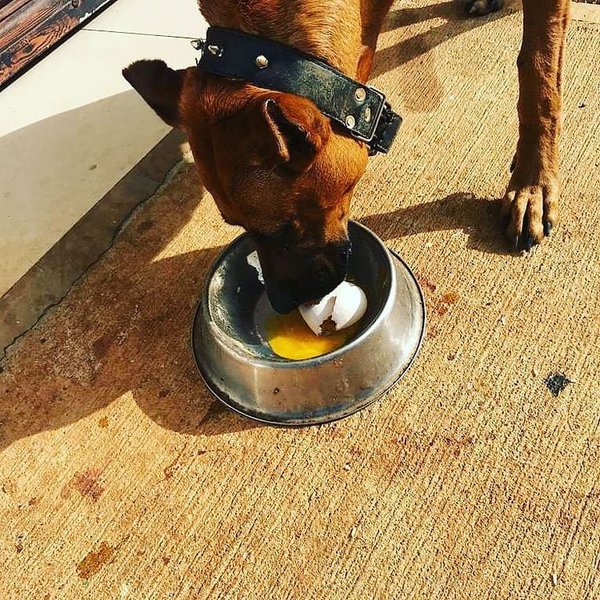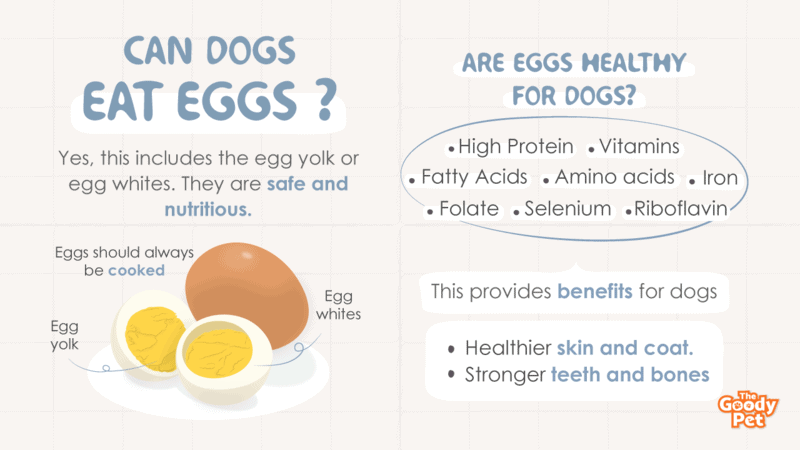Eggs are an affordable nutritional staple to help you get started in the morning since breakfast is the most important meal of the day. They can be eaten sunny-side up, boiled, scrambled, poached, or even raw.
When your pooch begins to gaze at your food, you will undoubtedly wonder if you can give a little bit of egg with them. We understand that you are constantly concerned about what your dog is eating, particularly when it comes to raw food. So, can dogs eat eggs?
Dogs can eat eggs, egg yolk, or even egg whites. All of your doggie’s nutritional needs will be met because of the vitamins, protein, and fatty acids found in eggs. Dogs of all ages should consume reasonable amounts of eggs to maintain their coat and skin healthy.
Keep on reading as we’ll look at the good and the bad effects of eggs on your dog in this article. Let’s get started!
Are Eggs Safe For Dogs?

Eggs are generally safe for dogs to eat and will not cause any concerns. As a result, eggs are a regular addition to several homemade pet diets, and most dogs find them to be safe and nutritious.
If you’re serving eggs that have been seasoned with salt or are in an omelet with onions or other possibly harmful ingredients, be sure to avoid them. You should also check to see whether the eggs include any additional ingredients, such as butter, oil, or pepper, which could be harmful to your dog.
If you are really concerned about whether different egg preparations may harm your dog, continue reading the following sections.
Can Dogs Eat Runny Egg Yolks?
Yes, canines can safely consume egg yolks in moderation; however, for a more balanced healthy snack, both egg yolks and egg whites should be provided to your dog. Egg yolks are abundant in Biotin vitamins, which are essential for good health.
Additionally, egg yolks have some of the greatest quantities of the nutrient choline. This substance aids in the development of healthy puppies’ brains in pregnant dogs. The following minerals are also found in egg yolks:
- Calcium
- Potassium
- Iron
- Phosphorus
- Magnesium
- Sodium
- Zinc
Can Egg Yolks Make My Dog Sick?
As long as the egg yolks are not raw, they are fine for your furry pets. Raw egg yolks are not beneficial to dogs in terms of nutrients. Moreover, raw eggs can infect your dog with Salmonella. This bacterial infection may cause vomiting and diarrhea as side effects.
How Much Egg White Can I Give My Dog?
Although most canines can benefit from eating raw egg whites, we recommend giving cooked egg whites to your dog instead.
You should be able to feed two eggs every day to a large dog that is above 60 lbs. On the other hand, you could offer one egg every day to a medium dog that is between 30 and 60 lbs.
Can Dogs Eat Eggshells?
Eggshells can be fed to your pooch occasionally. Because eggshells are high in nutrients, they can be good for your dog’s health. The shell contains a lot of calcium, which is beneficial to canine health in many ways, including heart health, bones, teeth, and even immune system health.
The amino acids found in eggshells are also required for a variety of bodily processes. To stay healthy, dogs require a total of ten amino acids. These are the following:
- Valine
- Tryptophan
- Phenylalanine
- Methionine
- Lysine
- Leucine
- Isoleucine
- Histidine
- Arginine
Are Eggshells A Good Bone Substitute?
You can offer eggshells for calcium if your doggie has trouble chewing on bones. However, eggshells do not include magnesium or phosphorus, which are essential minerals in bone and bone meals, thus your canine pet will need alternative sources of these minerals.
Are Eggs Healthy For Dogs?

Eating eggs is high in protein, as well as several vital amino and fatty acids, vitamins A and B12, selenium, iron, folate, and riboflavin, all of which provide health benefits for dogs, varying from healthier skin and coat to stronger teeth and bones.
While eggs can be properly introduced into your doggie’s meal plan, they should not be the sole source of nutrients for your dog’s body. When used as an addition to high-quality commercial dog food or a meat-based diet, eggs can be supplied in moderation a few times a week.
Can Eggs Cause A Biotin Deficiency In Dogs?
Your dogs may be deficient in biotin if you feed them raw eggs. This is due to the presence of avidin, the enzyme that binds to biotin and makes it less absorbable.
However, because egg yolks are high in biotin, your dog is unlikely to be deficient if you feed the entire egg. Biotin deficiency is uncommon in dogs, but it can occur.
Eggs should always be fully cooked before letting your pooch eat them in order to maximize biotin intake and ensure safety.
Are Eggs Good For Dogs With Liver Disease?
Eggs, which have the greatest accessible protein and choline content, are good proteins to serve for liver disease. It’s important to include eggs in your dog’s diet because they’re a good source of protein.
What Are The Side Effects Of Feeding Eggs to Dogs?
Despite the fact that side effects aren’t common or severe, it’s critical for pet parents like you to be aware of all the potential dangers of feeding eggs to your canines. Since eggs are high in fats, a significant side effect is that your dog may gain weight.
Other than weight gain, let’s take a look at some of the common side effects of eggs on dogs.
Biotin Deficiency
Avidin, a biotin inhibitor, is found in egg whites, which is a source of problems. Protein metabolism and cellular development are mostly controlled by biotin, often known as vitamin B7. This implies that Biotin will maintain your dog’s new fur strong and healthy by preventing it from shedding. This vital B vitamin is also required for maintaining a healthy complexion.
However, while the biotin inhibitors in egg whites are harmful, a huge amount of it would be required. Biotin deficiency would be uncommon if you let your dogs eat egg whites in moderation.
Salmonellosis
Salmonella is a disease that can infect dogs. Salmonella may also be spread to canines by owners who feed them raw eggs.
Salmonellosis is an infection that can occur if your pooch eats an egg infected with salmonella. Salmonellosis causes the following symptoms:
- Fever
- Lethargy
- Vomiting
- Diarrhea

High Cholesterol
Yes, eggs have a high cholesterol content. Many medical experts have stated for a long time that eating a lot of eggs can raise cholesterol levels. Dogs would be subject to the same theory.
However, there’s been a lot of controversy about whether eating cholesterol-containing meals truly raises blood cholesterol. Cholesterol, according to some scientists, is auto-regulated. The result is that if your dogs eat more cholesterol, their body will create less cholesterol.
So, eggs may produce high cholesterol in dogs, depending on the situation. In order to be safe, the egg must be fed only in small quantities.
Digestive Issues
The presence of an enzyme inhibitor in egg whites is one of the most common concerns among pet parents. This inhibitor may induce digestive issues in dogs, particularly in young puppies and older dogs. It shouldn’t really be much of a problem as long as you don’t include eggs as a regular part of the dog’s diet.
Make sure to try to feed your pooch eggs in moderation at first. They are in the clear if they show no signs or symptoms of intestinal disorders. However, after eating eggs, always keep an eye out. These symptoms include:
- Vomiting
- Diarrhea
- Bloating
- Loss of appetite
How Much Egg Should I Feed My Dog?
A couple of eggs a week is entirely acceptable to serve to a typical dog. Simply feed your dog one egg at a time for the first few days. The ability to consume 1 or 2 two eggs per day is limited to a smaller dog; nevertheless, a larger dog can eat 4 or 5 eggs each day.
If there is no evidence of intestinal issues, your doggie should be fine with eggs being added to his diet. However, it’s still best to contact your veterinarian before giving your dog eggs for the first time.
Can Dogs Eat Raw Eggs?
There is still no evidence that giving raw eggs to your dog has a nutritional benefit, however, the vitamin and mineral content may be reduced. Raw eggs can be fed to dogs, but because bacteria can cause infection, cooked eggs may be safer.
If you wish to offer raw eggs to your pooch, it’s doubtful that 1 or 2 properly sourced eggs a week will hurt them.

How Do I Cook Eggs For My Dog?
Cook only simple eggs for your pooch. Make sure you don’t use any seasonings like pepper, salt, chives, cayenne, ketchup, or anything else. To eradicate any unwanted bacteria and also protect your dog against salmonella, cook your egg until it’s done all the way through.
Can My Dog Eat Scrambled Eggs Every Day?
If it is proven safe for your dogs, they can eat scrambled eggs daily. But, please remember that scrambled eggs are high in calories, so if your canines are active, you can feed them scrambled eggs on a daily basis; however, if your dogs don’t receive enough activity, provide scrambled eggs in moderation.
Can Scrambled Eggs be Dangerous For My Dog?
Plain scrambled eggs won’t harm your dog, but be wary of sharing your own favorite scrambled eggs, which need oil or butter and are excellent when added with pepper, salt, or even hot sauce. Some flavorings and spices are unhealthy for dogs, and these unnecessary fats counteract the health benefits.
Can My Dog Eat Hard-Boiled Eggs?
Serving your dog hard-boiled eggs is a smart idea. Although some nutrients are lost during the boiling process, it is the simplest approach to delivering a plain unsalted egg to your dog. In addition, hard-boiled eggs make excellent dog snacks.

Can Dogs Eat Deviled Eggs?
Dogs can eat deviled eggs as cooked eggs are generally safe to be consumed. Deviled eggs are a simple recipe to make at home that your dog will adore. If you’re careful and follow basic guidelines, deviled eggs can be a terrific treat for your dog.
Before you offer the deviled egg to your dog, make sure it’s cool enough to handle, and don’t keep it out for too long.
Can Dogs Be Allergic To Eggs?
Eggs are found in a variety of dog food products, to the point where many canines develop allergies to them. Despite the fact that it is uncommon, your pooch may have an allergy to egg whites alone. Discuss your dog’s allergy to food with your veterinarian if you suspect it is a food allergy.





